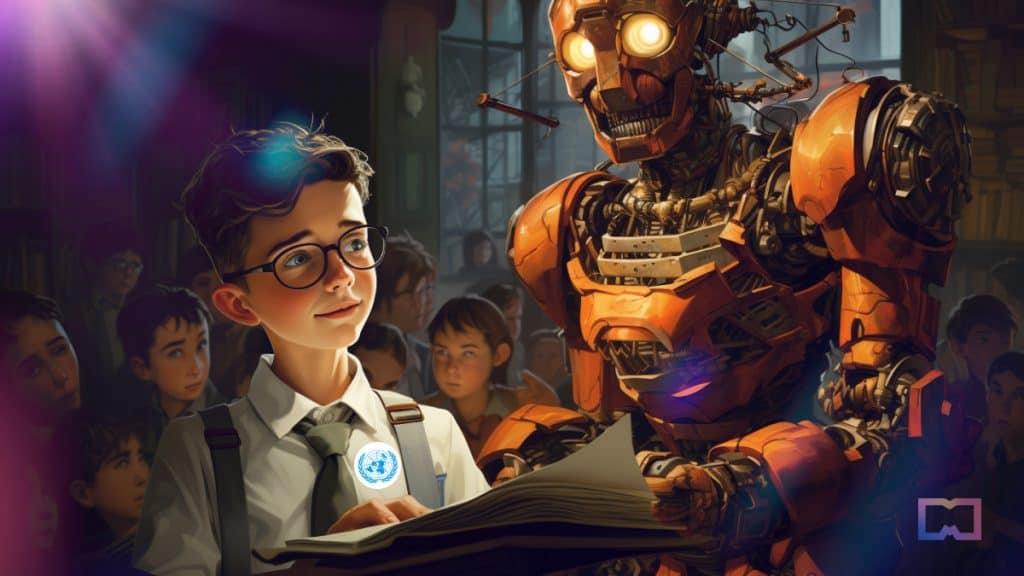UNESCO Urges Stringent AI Regulations in Schools, Citing Concerns for Childen Wellbeing


In Brief
UNESCO emphasizes strict AI regulations in education due to concerns about generative AI programs affecting children’s well-being and the need for public engagement and government oversight.
Teachers hold mixed opinions on ChatGPT in K-12 education, with concerns about cheating, reduced critical thinking, and potential overreliance on technology, despite recognizing its benefits in preparing students for tech-based careers and easing their workloads.

The United Nations’ (UN) education agency UNESCO has issued a call for stringent regulations governing the use of AI tools, notably the chatbot ChatGPT, within educational settings. The organization expressed deep concerns about the ethical implications of deploying generative AI programs in schools and highlighted the potential impact on children’s emotional well-being and susceptibility to manipulation.
This call for action underscores the need for public engagement, government oversight, and safeguards to ensure responsible AI integration in education.
Although AI technologies hold considerable promise in assisting students, including those with special needs, UNESCO emphasizes the need for cautious implementation.
Audrey Azoulay, the head of UNESCO, acknowledged that generative AI can be a valuable resource for human development but also warned of its potential for harm and prejudice. She stressed that using AI tools in education necessitates the active involvement of teachers, learners, and researchers in their design, as well as comprehensive government regulations to ensure safety and effectiveness.
While UNESCO did not specify a minimum age for using AI tools in schools, it pointed out that ChatGPT has a lower age limit of 13. However, many experts consider this threshold to be too low, advocating for legislation to raise the age limit to 16. This call for stricter oversight reflects growing concerns about AI’s impact on education, including fears of plagiarism and cheating, as well as the potential commercialization of AI solutions within the educational sector.
How Do Teachers Feel About ChatGPT?
According to a research by Age of Learning, teachers and educators have mixed feelings about ChatGPT in K-12 education (from kindergarten to 12th grade). While 42% of homeschool educators support it, concerns about identifying AI-generated work are prevalent. Meanwhile, schoolteachers, with 57% neutral on the matter, see potential benefits for special needs students and teaching tech.
However, 98% of schoolteachers express concerns, primarily about cheating, reduced critical thinking, and the risk of students becoming overly dependent on technology.
Teachers acknowledge the potential benefits of ChatGPT, such as preparing students for technology-based careers. They also recognize how ChatGPT can assist in generating writing prompts, grading assignments, and reducing their overall workload.
The Harm of Generative AI for Children in School
Using AI tools like ChatGPT in schools presents a range of risks for students. Students can bypass age restrictions to generate content for their assignments, leading to cheating. Plagiarism checkers and teachers can often detect ingenuine content, making it a risky endeavor.
Also, there are concerns about the potential decline in AI capabilities over time, which could make it unwise for students to rely solely on these tools, highlighting the importance of thorough research. Students must consider the long-term consequences of using AI-generated content, as schools and universities may revisit their work, discovering plagiarism and jeopardizing their academic credentials.
The lack of clear regulation around AI tools, including ChatGPT, leaves students without guidelines for responsible use. Furthermore, AI chatbots may provide misleading or biased information, potentially pushing political agendas or misrepresenting facts.
Ultimately, while AI tools offer shortcuts, students must be aware that relying on undeveloped technology carries risks, and traditional research and learning methods remain the safest approach.
Read more:
- University of Hong Kong Integrates AI Tools into Teaching
- Top UK Universities Develop Guiding Principles for Ethical Use of AI in Education
Disclaimer
In line with the Trust Project guidelines, please note that the information provided on this page is not intended to be and should not be interpreted as legal, tax, investment, financial, or any other form of advice. It is important to only invest what you can afford to lose and to seek independent financial advice if you have any doubts. For further information, we suggest referring to the terms and conditions as well as the help and support pages provided by the issuer or advertiser. MetaversePost is committed to accurate, unbiased reporting, but market conditions are subject to change without notice.
About The Author
Agne is a journalist who covers the latest trends and developments in the metaverse, AI, and Web3 industries for the Metaverse Post. Her passion for storytelling has led her to conduct numerous interviews with experts in these fields, always seeking to uncover exciting and engaging stories. Agne holds a Bachelor’s degree in literature and has an extensive background in writing about a wide range of topics including travel, art, and culture. She has also volunteered as an editor for the animal rights organization, where she helped raise awareness about animal welfare issues. Contact her on [email protected].
More articles

Agne is a journalist who covers the latest trends and developments in the metaverse, AI, and Web3 industries for the Metaverse Post. Her passion for storytelling has led her to conduct numerous interviews with experts in these fields, always seeking to uncover exciting and engaging stories. Agne holds a Bachelor’s degree in literature and has an extensive background in writing about a wide range of topics including travel, art, and culture. She has also volunteered as an editor for the animal rights organization, where she helped raise awareness about animal welfare issues. Contact her on [email protected].


















































